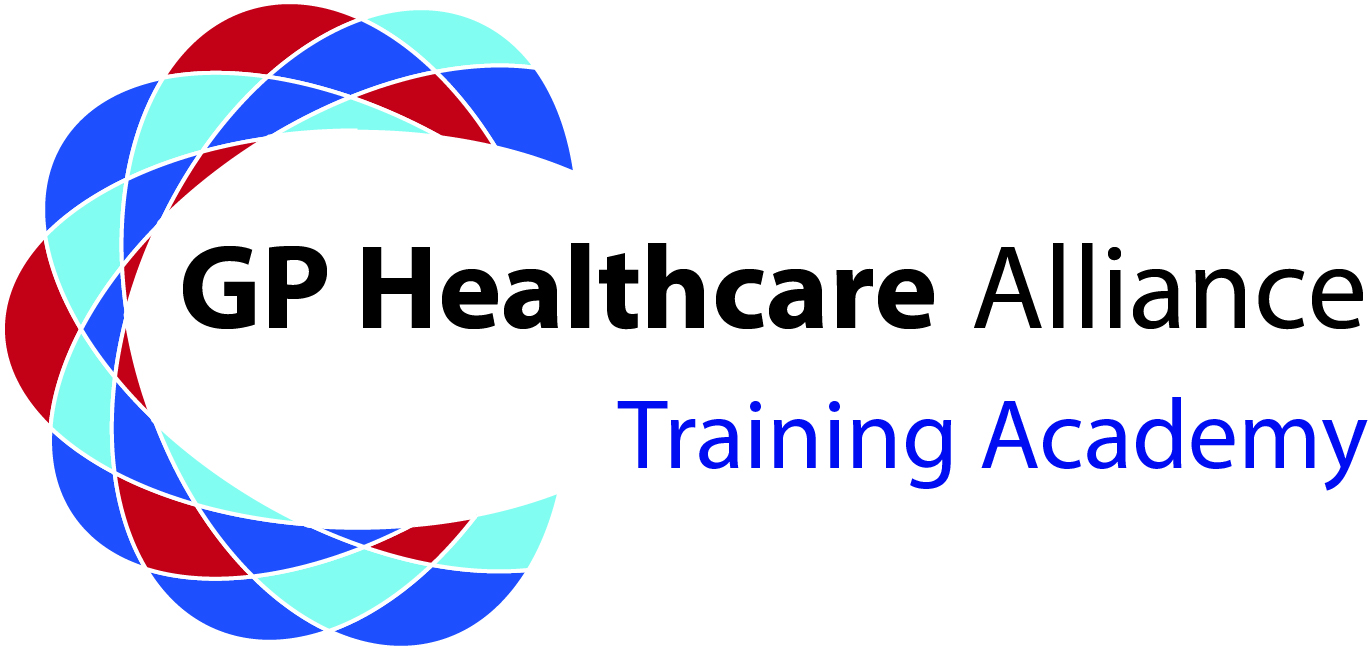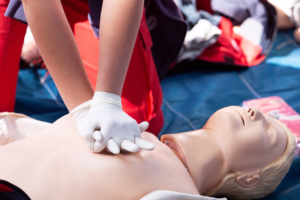This course is designed for any staff members who will be working in the health sector, either in a clinical or non-clinical role. The aim of this training is for the learner to be able to carry out basic life support as required by your workplace. You will always adhere to your workplace protocols; gain an understanding of what you will need to do and why, maintaining professional practices throughout.
Basic Life Support and Anaphylaxis (Online)
Course Content
Already Enrolled? Click the button to begin
Welcome to GP Healthcare Alliance’s Basic Life Support and Anaphylaxis (Online) Training course.
Estimated Completion Time: 3 Hour
Online only
Valid for 1 year
This course is designed for any staff members who will be working in either a clinical or non-clinical role. Basic Life Support is crucial for anyone who may encounter emergency situations. Whether you’re a healthcare professional, teacher, parent or concerned citizen, our BLS will equip you with the knowledge and confidence to respond effectively.
This course is very instructional so it would be beneficial to have a note pad at the ready, but please do not worry if you have not, there are downloadable files for your reference!
Course overview:
- What equipment could be useful and what does ‘D.R.A.B.C.’ stand for?
We will explore what equipment we may want to have handy, or at least know where it is stored if required.
We will learn what ‘D.R.A.B.C.’ stands for.
- Danger and Response.
We will consider what dangers might be present and how to try to get a response from the casualty.
- Airway, Breathing and Circulation.
We will focus on how we can check the airways and what we need to remember regarding breaths required, related to age.
- CPR and Using an Automated External Defibrillator (AED).
We will learn how to carry out CPR and to use an AED (practically if you are on face to face training).
- Choking recognition and action.
We will consider what the signs of choking are, our appropriate actions to take and techniques such as abdominal thrusts (Heimlich manoeuvre).
- Anaphylaxis.
We will learn Anaphylaxis recognition, what the symptoms might present as and how we would treat it using an Auto Adrenaline Injector (AAI).
- Useful links!
We have provided a couple of links that you may wish to explore.
- End of course assessment
This is where you will be able to show off all the information that you have learnt, there is quite a lot, so making notes would benefit you for a quick recap! You will need a pass rate of 80% or more to pass and be able to obtain your certificate, which can be downloaded and printed.
Please be aware that all content within this course is copyright protected
©2022 GP Healthcare Alliance.
Please scroll down each screen and click ‘continue’ where indicated, also be aware of the arrows or the relevant numbers on the bottom of the screen to ‘click on’ as needed.
Where possible we have provided audio support to utilise if preferred/required but please be aware that there are many screen shot examples for you to peruse also.
When you are ready to begin, click the “Start Course” button, Then click the Lesson name and then Launch Lesson.
Basic Life Support and Anaphylaxis (Online): Why BLS Course is Important for Healthcare Professionals
Are you a healthcare professional wondering how you can better prepare for emergency situations at work? Do you want to gain more confidence in providing urgent, lifesaving care?
Providing proper emergency response requires the right training and skills. This is where a Basic Life Support and Anaphylaxis (Online) course can make all the difference.
Here we’ll highlight exactly why BLS skills are critically important for anyone in the medical field and provide an overview of what key competencies you can master through formal instruction.
By the end, you’ll understand why this training is mandatory for ensuring high-quality patient care and you’ll be motivated to sign up for a course that boosts preparedness for medical emergencies.
So keep reading to learn more!
Why Should You Take BLS Training?
Enrolling in basic life support training delivers immense value for healthcare professionals. Here are some of the major benefits you can expect:
- Become truly ready to handle real emergencies: Learn how to make confident, informed decisions when faced with medical crises. Gain confidence through realistic practice.
- Master essential treatment protocols: Get in-depth instruction in administering urgent interventions like CPR, using AED devices, relieving airway obstructions, and more.
- Know how to operate specialized equipment: Understand the purpose and proper techniques for tools like bag valve masks, suction devices, oxygen cylinders – critical for saving lives.
- Ensure workplace regulatory compliance: Meet mandatory qualifications for clinical and hospital staff by attaining formal credentials.
- Validate skills for professional advancement: Show administrators your dedication and get noticed for growth opportunities by spotlighting your BLS competencies.
- Refine expertise over time: Supplementary materials allow you to review and expand your abilities long after initial instruction as protocols evolve.
- Handle paediatric and adult cases: Customised instruction accounts for different considerations whether assisting infants, children or mature patients.
- Prevent legal risks: Executing proper protocols minimises liability if questions emerge later about the emergency response process and outcomes.
Understanding these concepts equips any healthcare employee to approach high-stress medical events with greater assurance and react reliably. BLS techniques serve as the vital groundwork that skilled responders build upon when minutes make the difference between life and death.
What You Can Learn In Basic Life Support Training?
Honing must-have emergency response skills advances your ability to effectively assess situations, determine appropriate interventions, and act decisively when patients show signs of distress.
Here’s an overview of core competencies covered in Basic Life Support instruction crucial for clinical settings:
Understanding Basic Life Support (BLS) Principles
Basic life support represents the critical initial response to medical emergencies. It centres on rapid assessment and intervention to sustain ventilation and circulation when patients lose functioning. BLS protocols extend the window for healthcare teams to arrive for advanced measures.
We will ground you in foundational concepts like the DRABC approach outlining step-by-step response below:
D = Check scene for dangers to avoid additional harm
R = Attempt to get a response by tapping or shouting
A = Open airways using head tilt and chin lifts
B = Give rescue breaths with masks if the patient does not breathe
C = Begin chest compressions and defibrillation if no circulation is found
Instilling these structured response practices empowers you to maximize outcomes.
Mastery of Equipment and ‘DRABC’ Application
A major component of preparation is familiarity with available tools. We will overview medical devices like bag valve masks for assisted breathing and AEDs to revive normal heart rhythms. With all options visualized, selection and usage come automatically in stressful situations.
We then reinforce DRABC principles through scenarios. You will gain confidence in swiftly getting to patients, determining responsiveness, summoning help, retrieving equipment and providing care at each step guided by workplace protocols.
Frequent roleplays cement ability to execute procedures like CPR professionally when lives hang in the balance.
Proficiency in Core Resuscitation Techniques
Administering high-quality chest compressions is vital for maintaining blood flow when hearts stop. We build skills in delivering adequate depth and rate of compressions based on age and body size differences. Supporting ventilation via rescue breathing further sustains oxygen circulation.
You will practice operating AEDs to analyse arrhythmias and deliver shocks restoring organised electrical activity so hearts can resume pumping.
We emphasise following device voice prompts seamlessly while integrating with uninterrupted chest compressions during pauses.
Competence in Airway Obstruction Response
Inability to breathe can rapidly lead to brain damage and death. We prepare you to recognise signs of choking and facial indications of difficult ventilation.
Anaphylaxis Symptom and Treatment Awareness
Anaphylaxis causes dangerously low blood pressure and restricted airways. We will help recognise symptoms of allergic reactions and inject epinephrine via auto-injectors or nebulizers.
Additional Resources for Continuous Learning
We provide additional materials covering clinical protocols in more detail for your reference so you can build on the starter BLS knowledge gained.
Certify Your Skills: Take the Final Assessment
After absorbing so much critical knowledge and techniques for responding to medical emergencies, it is essential to validate your new expertise. This course concludes with an end of course assessment allowing you to demonstrate comprehensive retention and mastery of the material.
Preparing notes while progressing through course content will assist greatly with information recall and application skills needed for the various questions. Maximising retention of the many techniques covered gives you the best shot to shine when it counts.
Be a Lifesaver: Enrol in BLS Training Today!
Equip yourself with the essential skills and confidence needed to respond swiftly and effectively in medical emergencies. Join our Online Basic Life Support (BLS) training course or On Site Basic life Support training in Essex to master life saving techniques like CPR, AED usage, and airway management.
Whether you’re a seasoned healthcare professional or just starting your career, this course is your gateway to becoming a vital asset in critical situations.
Don’t wait until it’s too late. Enrol now and be prepared to make a difference when every second counts!
CPD for Organisations
We provide fully accredited course packages for your organisation, giving you the confidence your workforce is fully qualified.

